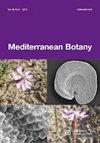寻找一个成功的易位:以黄芪为例
IF 0.7
4区 生物学
Q3 PLANT SCIENCES
引用次数: 2
摘要
黄芪是地中海西部地区一种濒临灭绝的一年生植物。它发生在伊比利亚半岛(东南部)、摩洛哥(东北部和西南部的两个主要地区)以及最东部的加那利群岛(兰萨罗特岛和富特文图拉岛)。在对遗传多样性和系统地理模式进行了彻底的研究,并提出了保护整个物种区域遗传多样性的管理计划后,现在是时候在物种保护方面走得更远了。有必要认识到基因贫困人口,以便能够成功地加强人口并找到现实的迁移地点。为此,计算了三个地理区域及其种群的Nei遗传多样性值。进一步评估多样性值,以计算每个区域内种群的最佳贡献,从而最大限度地扩大遗传库。为了评估在气候变化情景下该物种的最佳栖息地是否预计会增长或减少,将a.edulis当前气候适宜性的最佳模型预测到IPCC(2070_RCP8.5)未来情景中。不同地理区域表现出相似的遗传多样性值。在每个地理区域中,有助于最大限度地扩大遗传库的种群与先前研究中提出的种群相似,但并不相等。该物种未来的潜在栖息地显示出明显的范围下降,这将影响迁移工作。本文章由计算机程序翻译,如有差异,请以英文原文为准。
Looking for a successful translocation: the case of Astragalus edulis
Astragalus edulis (Fabaceae) is an endangered annual plant species from the western Mediterranean region. It occurs in the Iberian Peninsula (SE), Morocco (two main locations in the NE and SW), and the easternmost Canary Islands (Lanzarote and Fuerteventura). After a thorough study assessing genetic diversity and phylogeographic patterns, and a proposal of a management plan to preserve the genetic diversity across the entire area of the species, it is about time to go further in the species conservation. It is necessary to recognize genetically impoverished populations to be able to successfully reinforce populations and find realistic places for translocations. For this, Nei’s genetic diversity values were calculated for the three geographic areas and for their populations. Diversity values were further evaluated to calculate the optimal contribution for the populations within each area to maximize the genetic pool. To evaluate whether the optimum habitat for the species is expected to grow or decrease under a climate change scenario, the optimal model of current climatic suitability of A. edulis was projected into the IPCC (2070_RCP8.5) future scenario. The different geographical areas showed similar genetic diversity values. The populations that contribute to maximize the genetic pool in each geographic area were similar, but not equal, to those proposed in previous studies. The future potential habitat for the species shows a significant range decline, which will affect translocation efforts.
求助全文
通过发布文献求助,成功后即可免费获取论文全文。
去求助
来源期刊

Mediterranean Botany
Agricultural and Biological Sciences-Plant Science
CiteScore
2.40
自引率
10.00%
发文量
30
审稿时长
12 weeks
期刊介绍:
Mediterranean Botany (ISSNe 2603-9109), formerly Lazaroa, is a biannual journal that publishes original research studies in the field of Botany including plant systematics, vegetation ecology, biogeography, evolutionary biology, ecophysiology, community ecology, ethnobotany and conservation biology on Mediterranean biomes but also in interacting areas.
Mediterranean Botany is an OPEN ACCESS Journal, free of charges for any published article.
 求助内容:
求助内容: 应助结果提醒方式:
应助结果提醒方式:


